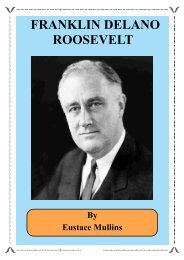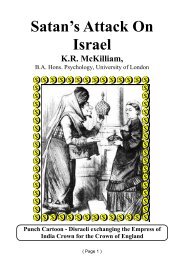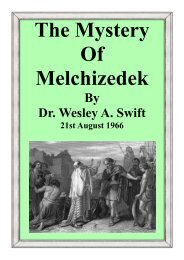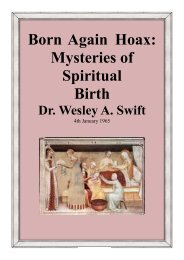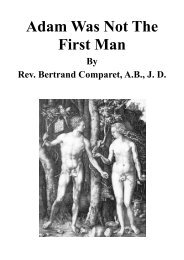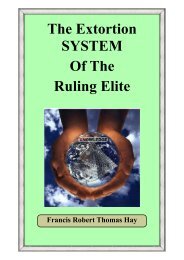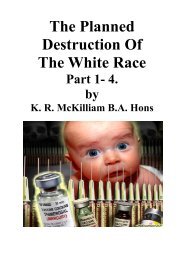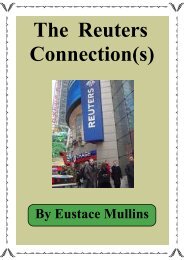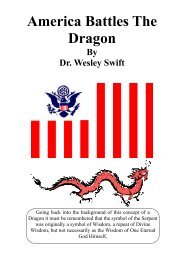Curse of Cannan - The New Ensign
Curse of Cannan - The New Ensign
Curse of Cannan - The New Ensign
You also want an ePaper? Increase the reach of your titles
YUMPU automatically turns print PDFs into web optimized ePapers that Google loves.
number <strong>of</strong> shares in the newly organized Federal Reserve Bank <strong>of</strong> <strong>New</strong> York, paying for the<br />
stock with the Czar's sequestered funds. Thus the Roman<strong>of</strong>f family actually owns the controlling<br />
interest in the Federal Reserve Banks today!<br />
Other deposits <strong>of</strong> the Czar included $35-50 million in the Bank <strong>of</strong> England, $25 million in<br />
Barclay's, $30 million in Lloyd's Bank, $100 million in the Bank <strong>of</strong> France, $80 million in the<br />
Rothschild Bank in Paris, and $132 million in the Mendelssohn Bank in Berlin. Since 1917, a<br />
cloud has hung over the financial structure <strong>of</strong> the Western democracies, threatening their<br />
jerrybuilt financial structure, the fear that some court somewhere, might eventually rule that the<br />
Czar's funds must be turned over to the rightful heirs. This would affect not only the ownership<br />
<strong>of</strong> the Federal Reserve Bank stock, but, with payment <strong>of</strong> interest, would mean the end <strong>of</strong> our ten<br />
largest financial institutions. Does anyone wonder why the United States government, which is<br />
under the total direction <strong>of</strong> the Big Ten Banks, continually makes every effort to finance and<br />
feed the crumbling Soviet empire? Can anyone predict the financial calamity which would ensue<br />
if the Roman<strong>of</strong>fs were restored to the throne <strong>of</strong> Russia, and asked for their money back, or if<br />
they got a court ruling anywhere in the world to that effect?<br />
This catastrophe loomed on the horizon at one point. <strong>The</strong> <strong>New</strong> York Times <strong>of</strong> July 20, 1929,<br />
reported on the progress <strong>of</strong> a lawsuit brought by the Czar's mother and thirty-two <strong>of</strong> the Roman<strong>of</strong>f<br />
heirs against Guaranty Trust and National City Bank. F. Dudley Kohler, an attorney representing<br />
James Egan, Public Administrator, issued the following Legal Notice which appeared in the Law<br />
Journal, "Notice is hereby given to all persons, corporations, banks, trustees having assets,<br />
deposits and securities <strong>of</strong> the late Nicholas II, that a statement and account <strong>of</strong> same is forthwith<br />
demanded, and in the event that no such statement <strong>of</strong> account is rendered, all such persons will<br />
be held responsible for the amounts, plus interest and the cost <strong>of</strong> discovery proceedings." Both<br />
the case and Kohler then disappeared from the pages <strong>of</strong> the <strong>New</strong> York Times. Apparently no<br />
account or statement was ever given. To have done so would have provided legal evidence <strong>of</strong><br />
the debt, and would have made repayment inevitable. Charles Recht, counsel for the Soviet<br />
Union, retained Edward H. Fallows to represent the Soviet government, but no further legal<br />
proceedings are to be found.<br />
Nevertheless, the Roman<strong>of</strong>f demand did have tremendous repercussions. <strong>The</strong> threat <strong>of</strong> a<br />
tremendous withdrawal from two <strong>of</strong> <strong>New</strong> York's most over-extended and precarious banks caused<br />
an underground pressure against call money, or cash, on Wall Street, which then precipitated<br />
the Crash <strong>of</strong> 1929. Even though the Masonic Canaanites controlled the courts in the United<br />
States, they could not be certain that the Roman<strong>of</strong>fs might not find a court in some other country<br />
which would grant them a judgment, or even an injunction against Guaranty Trust, a J. P. Morgan<br />
controlled bank, and National City Bank, the Rothschild and Rockefeller bank in <strong>New</strong> York.<br />
This threat, coming at the very height <strong>of</strong> the stock market boom <strong>of</strong> the 1920s, cast a pall over<br />
the wheelings and dealings <strong>of</strong> the speculators, and caused immediate pressure on short term<br />
funds, resulting in the Great Depression.<br />
To avoid such threats in the future, Roosevelt-Litvin<strong>of</strong>f agreements were concluded between the<br />
United States and Russia in 1933 and 1934. In these agreements, the United States unilaterally<br />
recognized all claims <strong>of</strong> the Soviet Government to funds <strong>of</strong> the Imperial Russian Government.<br />
Whether this could be made applicable to the funds <strong>of</strong> Czar Nicholas has never been tested in<br />
court.<br />
<strong>The</strong> Roosevelt-Litvin<strong>of</strong>f Pact also put the diplomats <strong>of</strong> the world on notice that Roosevelt had<br />
now formalized the extended support formerly rendered to the Soviet Government by "private<br />
interests" such as the Federal Reserve Bank <strong>of</strong> <strong>New</strong> York and J. P. Morgan Co. since 1917. Not<br />
all <strong>of</strong> this was from private banks. It included a gift <strong>of</strong> $20 million from Woodrow Wilson's<br />
Special War Fund which had been voted him by Congress; the money was dispatched to Russia<br />
by way <strong>of</strong> Elihu Root. <strong>The</strong> Red Cross, Kuhn, Loeb. Co., and many other Wall Street firms had<br />
been active in financing the Soviet Government; henceforth, that burden would be borne directly<br />
( Page 109)



